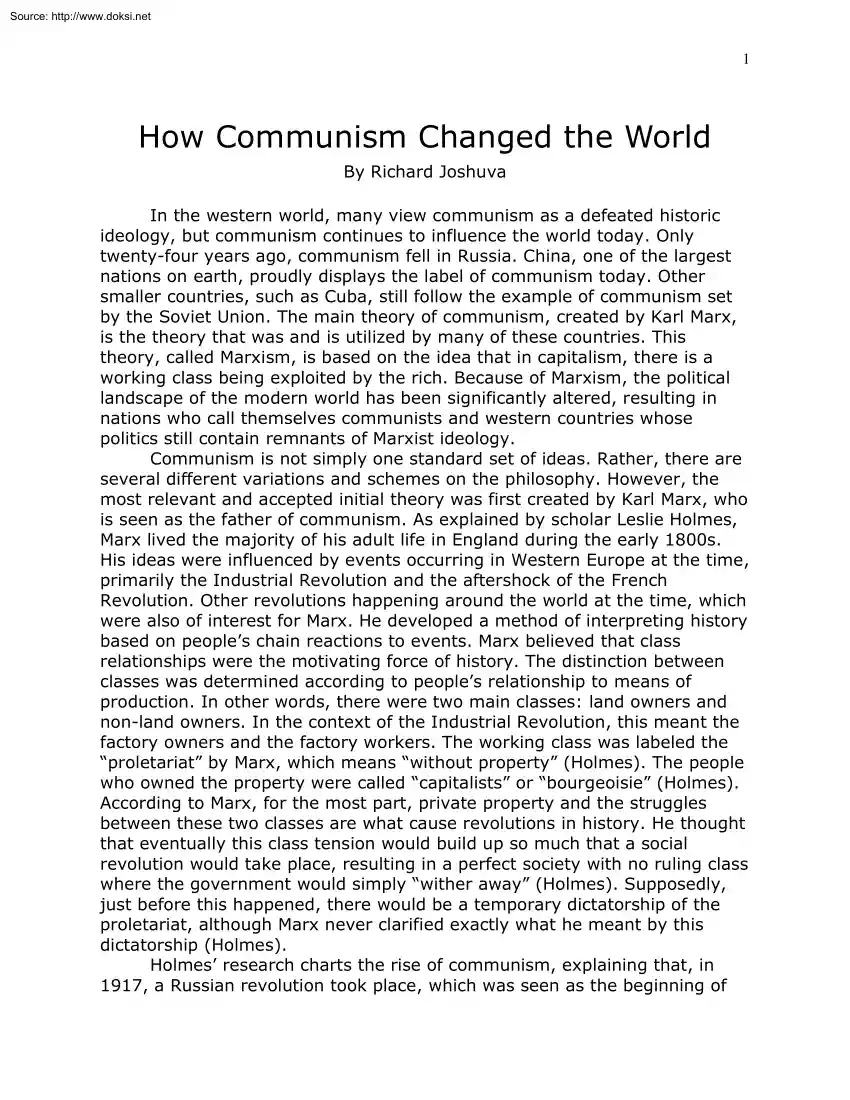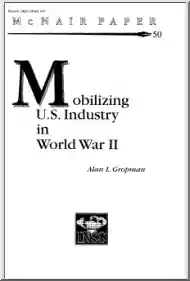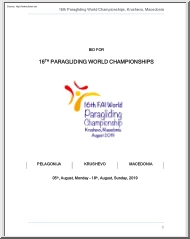Please log in to read this in our online viewer!

Please log in to read this in our online viewer!
No comments yet. You can be the first!
What did others read after this?
Content extract
Source: http://www.doksinet 1 How Communism Changed the World By Richard Joshuva In the western world, many view communism as a defeated historic ideology, but communism continues to influence the world today. Only twenty-four years ago, communism fell in Russia. China, one of the largest nations on earth, proudly displays the label of communism today. Other smaller countries, such as Cuba, still follow the example of communism set by the Soviet Union. The main theory of communism, created by Karl Marx, is the theory that was and is utilized by many of these countries. This theory, called Marxism, is based on the idea that in capitalism, there is a working class being exploited by the rich. Because of Marxism, the political landscape of the modern world has been significantly altered, resulting in nations who call themselves communists and western countries whose politics still contain remnants of Marxist ideology. Communism is not simply one standard set of ideas. Rather, there are
several different variations and schemes on the philosophy. However, the most relevant and accepted initial theory was first created by Karl Marx, who is seen as the father of communism. As explained by scholar Leslie Holmes, Marx lived the majority of his adult life in England during the early 1800s. His ideas were influenced by events occurring in Western Europe at the time, primarily the Industrial Revolution and the aftershock of the French Revolution. Other revolutions happening around the world at the time, which were also of interest for Marx. He developed a method of interpreting history based on people’s chain reactions to events. Marx believed that class relationships were the motivating force of history. The distinction between classes was determined according to people’s relationship to means of production. In other words, there were two main classes: land owners and non-land owners. In the context of the Industrial Revolution, this meant the factory owners and the
factory workers. The working class was labeled the “proletariat” by Marx, which means “without property” (Holmes). The people who owned the property were called “capitalists” or “bourgeoisie” (Holmes). According to Marx, for the most part, private property and the struggles between these two classes are what cause revolutions in history. He thought that eventually this class tension would build up so much that a social revolution would take place, resulting in a perfect society with no ruling class where the government would simply “wither away” (Holmes). Supposedly, just before this happened, there would be a temporary dictatorship of the proletariat, although Marx never clarified exactly what he meant by this dictatorship (Holmes). Holmes’ research charts the rise of communism, explaining that, in 1917, a Russian revolution took place, which was seen as the beginning of Source: http://www.doksinet 2 communism in power. This revolution would eventually lead
to the beginning of the Union of Soviet Socialist Republics (USSR) in 1922, also known as the Soviet Union. The Tsarist autocracy, which had been in place for centuries, was replaced by the Bolsheviks, the first communist party in the world, led by Vladimir Lenin. After a series of power struggles between the Bolsheviks and their political enemies, the Bolsheviks gained complete control of Russia. In 1924, Lenin died, and the party needed a new leader. There were several competitors, but Joseph Stalin was the person eventually chosen. After Stalin took power, he instituted his own economic system of complete socialism, called the Five-Year Plan. The plan worked by setting specific production goals for the entire country. This included overarching control over the agricultural sphere. However, some of the slightly wealthier farmers, known as kulaks, refused to join the state system of collective farming. When they refused, their property was confiscated, and they were sent to Siberia to
serve as slave labor. Holmes explains that 99% percent of farmland was added to the collective system by the close of the 1930s. Because of this collectivization, Russia experienced a harsh famine from 1932-1933 that resulted in the death of millions of people, and Stalin was accused of causing it (Holmes). Stalin and the Communists did not seize control over only economic life; they also seized many civil liberties. All negative speech regarding public policy was prohibited, and the secret police became far more powerful (Holmes). The Communists were especially harsh towards religious groups such as the Roman Catholics and Jewish communities (“Union”). Rather than deal with political enemies in a peaceful fashion, Stalin chose to slaughter any person or group that posed a possible threat to his power. He continued to rule through World War II into the Cold War, when the Soviet Union emerged as one of the two most powerful nations on earth, along with United States, the USSR’s
capitalist rival. Around the time of the Cold War, a new nation founded on the ideas of communism began to rise; this nation was China (“Union”). According to scholar Samir Amin, China’s radical communist revolution was led by Mao Zedong. His goal was to create an anti-imperialist movement that would lead towards the greater goal of socialism. The revolution first began in the 1930s, when Mao sought to harness the power of the peasant class in China to propel his movement. When the revolution took place, socialism first affected the area of agriculture. None of the land was privately owned. Instead, there were village communes which could be borrowed for use by families who farmed. The actual land still belonged to the whole nation (Amin). As Marshall Berman points out, this is different from the Soviet Union, because in 1917, after a peasant revolution, the people in power in the USSR chose to recognize private property of those who received land from the government. However,
modern China has changed While civil liberties continue to be scarce, economically, China is growing fast Source: http://www.doksinet 3 and becoming more modern every day. Western countries are even beginning to feel endangered by China’s growth, with the New York Times printing an article in June 2005 titled “Chinese Strength, U.S Weakness” (Berman). Chinese success is often used as an example by those who support a socialist system of economics, because of China’s ability to keep up with the modern world and still remain communist. Some people see communism as a “doomed” system, incapable of working because of its very nature. Gang Ke is one these people; he describes communism as a fusion of politics and economics that is totalitarian and relies on a state-controlled, unchallengeable monopoly. According to Ke, this kind of “fusion” society leads to an economy dictated by the whims of those who happen to be in power. This system results in a greater emphasis on
central government rather than the individual. Ke believes that the better alternative to communism is a liberal democracy, more specifically the kind of democracy which has been so successful in the West. He views the Chinese system of politics as a barrier to freedom, desperately in need of reform (Ke 477). Regardless of Ke’s opinions about communism in China, it is undeniable that the essence and ideology of communism and more specifically Marxism have had profound influence on modern politics in the West. Marxism’s basis is that the people who control the means of production in a capitalistic system will actively exploit the people who work for them. This idea is still very relevant in modern Western politics, which is demonstrated by the remarkable success of the democratic presidential candidate, Bernie Sanders. Although ultimately losing the Democratic nomination, Sanders came close to closing the polling gap with Hilary Clinton, and his view of taxes is an unmistakable echo
of Marx’s beliefs (Frizell). In May of 2015, Sanders began endorsing a “Robin Hood Tax” The purpose of this tax was to take 0.5 percent of every Wall Street transaction to help pay for American students to attend college for free (“Sanders”). The ideology behind the tax is that rich Wall Street investors are unfairly profiting at the expense of the average worker. The similarity between Sanders’s ideas and Marxism is clear; the only difference is that Sanders does not call for revolution. He would rather change a little at a time Evidence of communism’s influence permeates the world, whether it is in modern politics, history books, or museums of war. The Marxist concept of exploitation of the poor by the greedy rich has taken hold among academics and laborers alike. The Soviet Union and modern China have provided clear historical proof of how communism can work, but not necessarily how it does work, because of the varied and unique forms communism can take. Despite
communism’s ideas originating over a century ago, they continue to be just as relevant and radical today as when they were conceived, if not more so. Communism has altered the world in a way that Marx probably never thought was possible. Source: http://www.doksinet 4 Works Cited Amin, Samir. “China 2013” Monthly Review: An Independent Socialist Magazine 64.10 (2013): 14-33 Academic Search Premier Web 11 Nov. 2015 Berman, Marshall. “Marx in China” Dissent (00123846) 2006: 18+. Academic Search Premier Web 2 Nov 2015 Frizell, Sam. “Bernie Sanders Takes The Lead In Iowa Poll.” Timecom (2015):NPAG Academic Search Premier Web 16 Nov. 2015 Holmes, Leslie. Communism: A Very Short Introduction Oxford, UK: Oxford University Press, 2009. eBook Collection (EBSCOhost) Web 21 Oct 2015. Ke, Gang. “A Doomed Model Of Institutional Design: On the Political Economy Of Communism.” International Social Science Journal 46141 (1994): 463. Academic Search Premier Web 23 Oct 2015
“Sanders Introduces Robin Hood Tax In Senate.” National Nurse 1114 (2015): 7. Academic Search Premier Web 13 Nov 2015 “Union Of Soviet Socialist Republics.” Columbia Electronic Encyclopedia, 6Th Edition (2015): 1-8. Academic Search Premier Web 23 Oct 2015 About the Author I am a high school student who took this class as a way to earn college credit before I graduated. In school, I never considered myself a writer, and I wrote only out of necessity. However, over time, I found myself becoming better and better at it with practice. Eventually, I reached a point where, as long as I was interested in the topic, I could write without too much hesitation. For my writing process, I like to start the paper as soon as possible to avoid procrastination. After starting, I try to get all my thoughts written down, constantly correcting and changing my work as I write. After this is finished, I revise and proofread several times in order to fix mistakes and perfect it as much as possible.
I am happy that I kept trying to write even when I hated it or hated my own writing. I think those writing skills will be helpful in many other areas of my life
several different variations and schemes on the philosophy. However, the most relevant and accepted initial theory was first created by Karl Marx, who is seen as the father of communism. As explained by scholar Leslie Holmes, Marx lived the majority of his adult life in England during the early 1800s. His ideas were influenced by events occurring in Western Europe at the time, primarily the Industrial Revolution and the aftershock of the French Revolution. Other revolutions happening around the world at the time, which were also of interest for Marx. He developed a method of interpreting history based on people’s chain reactions to events. Marx believed that class relationships were the motivating force of history. The distinction between classes was determined according to people’s relationship to means of production. In other words, there were two main classes: land owners and non-land owners. In the context of the Industrial Revolution, this meant the factory owners and the
factory workers. The working class was labeled the “proletariat” by Marx, which means “without property” (Holmes). The people who owned the property were called “capitalists” or “bourgeoisie” (Holmes). According to Marx, for the most part, private property and the struggles between these two classes are what cause revolutions in history. He thought that eventually this class tension would build up so much that a social revolution would take place, resulting in a perfect society with no ruling class where the government would simply “wither away” (Holmes). Supposedly, just before this happened, there would be a temporary dictatorship of the proletariat, although Marx never clarified exactly what he meant by this dictatorship (Holmes). Holmes’ research charts the rise of communism, explaining that, in 1917, a Russian revolution took place, which was seen as the beginning of Source: http://www.doksinet 2 communism in power. This revolution would eventually lead
to the beginning of the Union of Soviet Socialist Republics (USSR) in 1922, also known as the Soviet Union. The Tsarist autocracy, which had been in place for centuries, was replaced by the Bolsheviks, the first communist party in the world, led by Vladimir Lenin. After a series of power struggles between the Bolsheviks and their political enemies, the Bolsheviks gained complete control of Russia. In 1924, Lenin died, and the party needed a new leader. There were several competitors, but Joseph Stalin was the person eventually chosen. After Stalin took power, he instituted his own economic system of complete socialism, called the Five-Year Plan. The plan worked by setting specific production goals for the entire country. This included overarching control over the agricultural sphere. However, some of the slightly wealthier farmers, known as kulaks, refused to join the state system of collective farming. When they refused, their property was confiscated, and they were sent to Siberia to
serve as slave labor. Holmes explains that 99% percent of farmland was added to the collective system by the close of the 1930s. Because of this collectivization, Russia experienced a harsh famine from 1932-1933 that resulted in the death of millions of people, and Stalin was accused of causing it (Holmes). Stalin and the Communists did not seize control over only economic life; they also seized many civil liberties. All negative speech regarding public policy was prohibited, and the secret police became far more powerful (Holmes). The Communists were especially harsh towards religious groups such as the Roman Catholics and Jewish communities (“Union”). Rather than deal with political enemies in a peaceful fashion, Stalin chose to slaughter any person or group that posed a possible threat to his power. He continued to rule through World War II into the Cold War, when the Soviet Union emerged as one of the two most powerful nations on earth, along with United States, the USSR’s
capitalist rival. Around the time of the Cold War, a new nation founded on the ideas of communism began to rise; this nation was China (“Union”). According to scholar Samir Amin, China’s radical communist revolution was led by Mao Zedong. His goal was to create an anti-imperialist movement that would lead towards the greater goal of socialism. The revolution first began in the 1930s, when Mao sought to harness the power of the peasant class in China to propel his movement. When the revolution took place, socialism first affected the area of agriculture. None of the land was privately owned. Instead, there were village communes which could be borrowed for use by families who farmed. The actual land still belonged to the whole nation (Amin). As Marshall Berman points out, this is different from the Soviet Union, because in 1917, after a peasant revolution, the people in power in the USSR chose to recognize private property of those who received land from the government. However,
modern China has changed While civil liberties continue to be scarce, economically, China is growing fast Source: http://www.doksinet 3 and becoming more modern every day. Western countries are even beginning to feel endangered by China’s growth, with the New York Times printing an article in June 2005 titled “Chinese Strength, U.S Weakness” (Berman). Chinese success is often used as an example by those who support a socialist system of economics, because of China’s ability to keep up with the modern world and still remain communist. Some people see communism as a “doomed” system, incapable of working because of its very nature. Gang Ke is one these people; he describes communism as a fusion of politics and economics that is totalitarian and relies on a state-controlled, unchallengeable monopoly. According to Ke, this kind of “fusion” society leads to an economy dictated by the whims of those who happen to be in power. This system results in a greater emphasis on
central government rather than the individual. Ke believes that the better alternative to communism is a liberal democracy, more specifically the kind of democracy which has been so successful in the West. He views the Chinese system of politics as a barrier to freedom, desperately in need of reform (Ke 477). Regardless of Ke’s opinions about communism in China, it is undeniable that the essence and ideology of communism and more specifically Marxism have had profound influence on modern politics in the West. Marxism’s basis is that the people who control the means of production in a capitalistic system will actively exploit the people who work for them. This idea is still very relevant in modern Western politics, which is demonstrated by the remarkable success of the democratic presidential candidate, Bernie Sanders. Although ultimately losing the Democratic nomination, Sanders came close to closing the polling gap with Hilary Clinton, and his view of taxes is an unmistakable echo
of Marx’s beliefs (Frizell). In May of 2015, Sanders began endorsing a “Robin Hood Tax” The purpose of this tax was to take 0.5 percent of every Wall Street transaction to help pay for American students to attend college for free (“Sanders”). The ideology behind the tax is that rich Wall Street investors are unfairly profiting at the expense of the average worker. The similarity between Sanders’s ideas and Marxism is clear; the only difference is that Sanders does not call for revolution. He would rather change a little at a time Evidence of communism’s influence permeates the world, whether it is in modern politics, history books, or museums of war. The Marxist concept of exploitation of the poor by the greedy rich has taken hold among academics and laborers alike. The Soviet Union and modern China have provided clear historical proof of how communism can work, but not necessarily how it does work, because of the varied and unique forms communism can take. Despite
communism’s ideas originating over a century ago, they continue to be just as relevant and radical today as when they were conceived, if not more so. Communism has altered the world in a way that Marx probably never thought was possible. Source: http://www.doksinet 4 Works Cited Amin, Samir. “China 2013” Monthly Review: An Independent Socialist Magazine 64.10 (2013): 14-33 Academic Search Premier Web 11 Nov. 2015 Berman, Marshall. “Marx in China” Dissent (00123846) 2006: 18+. Academic Search Premier Web 2 Nov 2015 Frizell, Sam. “Bernie Sanders Takes The Lead In Iowa Poll.” Timecom (2015):NPAG Academic Search Premier Web 16 Nov. 2015 Holmes, Leslie. Communism: A Very Short Introduction Oxford, UK: Oxford University Press, 2009. eBook Collection (EBSCOhost) Web 21 Oct 2015. Ke, Gang. “A Doomed Model Of Institutional Design: On the Political Economy Of Communism.” International Social Science Journal 46141 (1994): 463. Academic Search Premier Web 23 Oct 2015
“Sanders Introduces Robin Hood Tax In Senate.” National Nurse 1114 (2015): 7. Academic Search Premier Web 13 Nov 2015 “Union Of Soviet Socialist Republics.” Columbia Electronic Encyclopedia, 6Th Edition (2015): 1-8. Academic Search Premier Web 23 Oct 2015 About the Author I am a high school student who took this class as a way to earn college credit before I graduated. In school, I never considered myself a writer, and I wrote only out of necessity. However, over time, I found myself becoming better and better at it with practice. Eventually, I reached a point where, as long as I was interested in the topic, I could write without too much hesitation. For my writing process, I like to start the paper as soon as possible to avoid procrastination. After starting, I try to get all my thoughts written down, constantly correcting and changing my work as I write. After this is finished, I revise and proofread several times in order to fix mistakes and perfect it as much as possible.
I am happy that I kept trying to write even when I hated it or hated my own writing. I think those writing skills will be helpful in many other areas of my life




 Just like you draw up a plan when you’re going to war, building a house, or even going on vacation, you need to draw up a plan for your business. This tutorial will help you to clearly see where you are and make it possible to understand where you’re going.
Just like you draw up a plan when you’re going to war, building a house, or even going on vacation, you need to draw up a plan for your business. This tutorial will help you to clearly see where you are and make it possible to understand where you’re going.